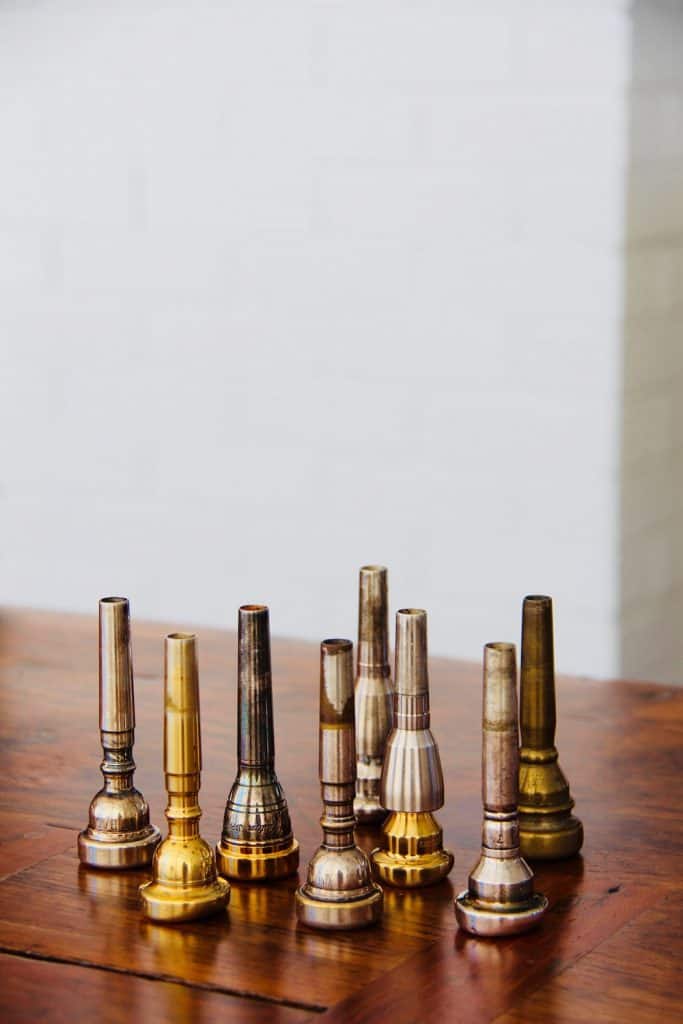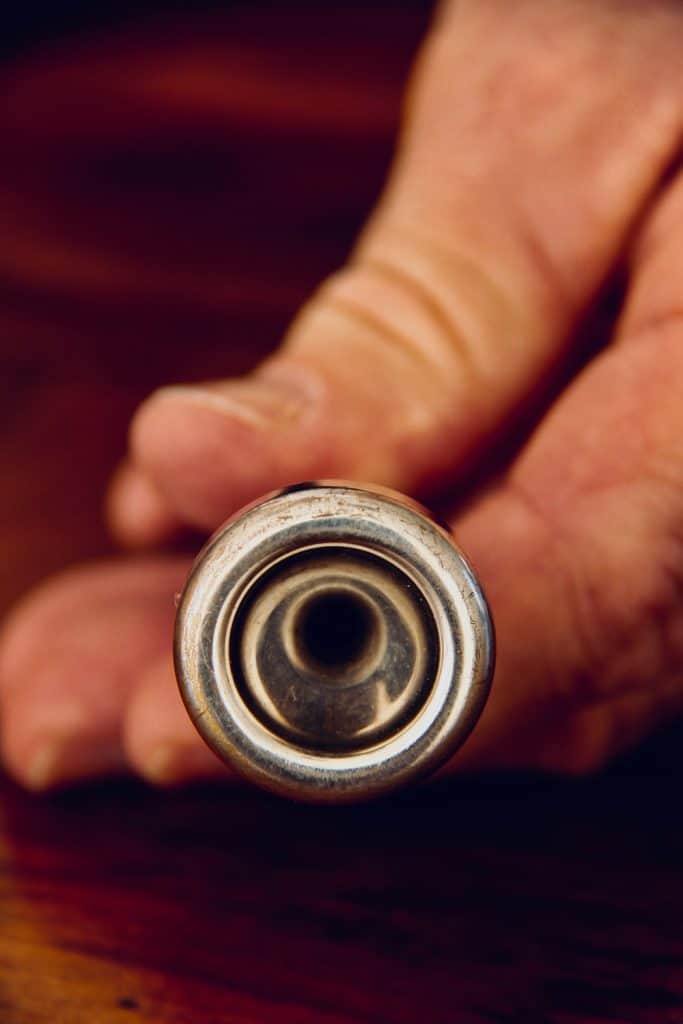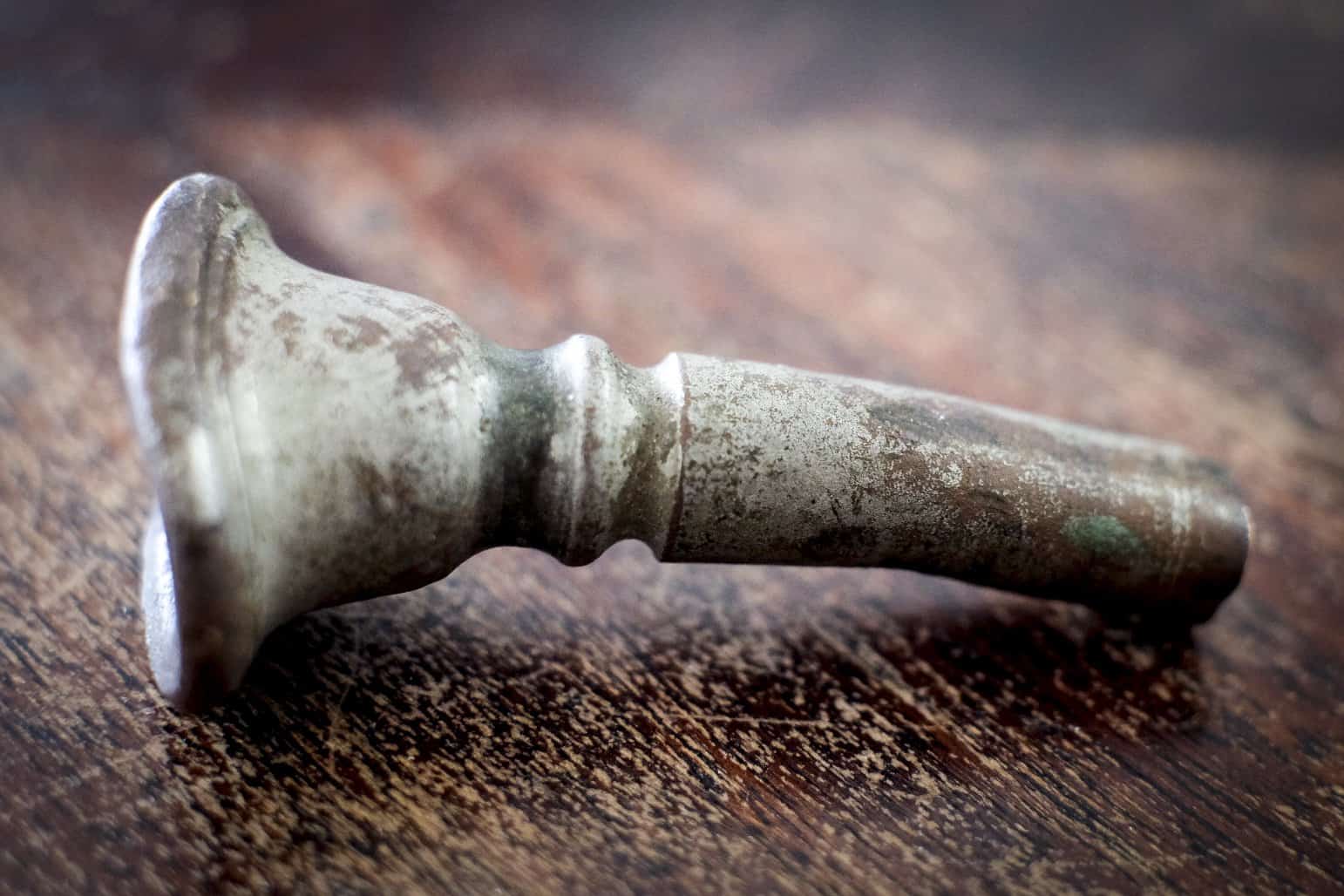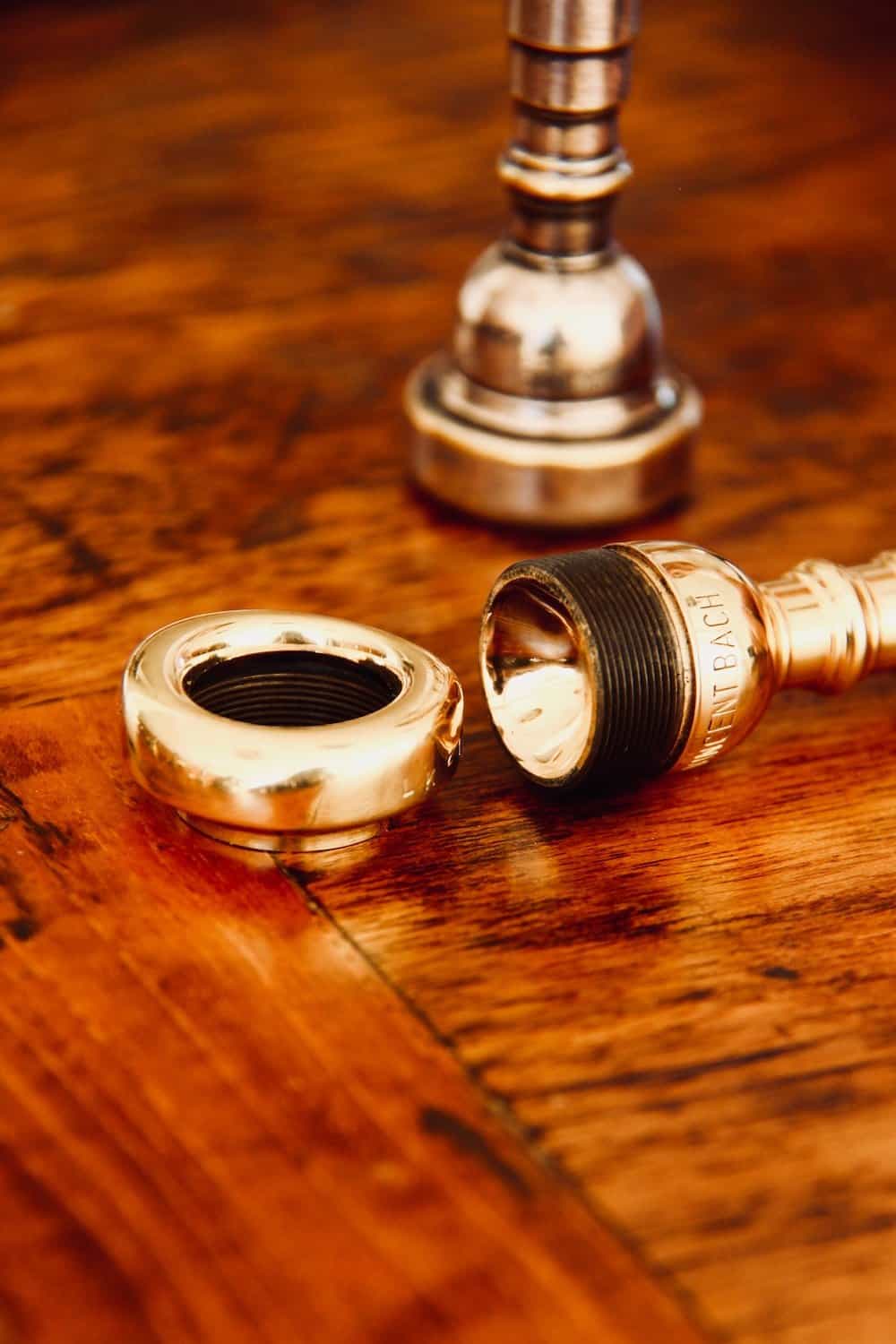The trumpet mouthpiece is a critical and oft neglected piece of essential equipment. If a beginner starts with the wrong mouthpiece there’s not much that’s going to go well.
[If you’re here because your mouthpiece is stuck don’t do anything before you look over here…]

Used Trumpet Mouthpieces
Most new trumpets come with a standard, middle-of-the-road size that will work for most players. Occasionally a used horn will come with a bizarre trumpet mouthpiece that would make a better paperweight.
Some really old horns will come with a mouthpiece with a playing surface that is damaged or worn beyond use. If the surface that will touch the lips is not silver, gold, nickel or some fancy new plastic I wouldn’t use it.
What I really mean is that if it used to be plated but is worn down through to the brass its time has passed. Some people’s lips and/or skin will react badly to various metals and raw brass is the worst of the lot. This mouthpiece is an old favourite but in the bright light it looks like it’s time to plate it or plant it.

Buying a New Trumpet Mouthpiece
There are some good trumpet mouthpiece comparison charts on the internet. If you have a brand name mouthpiece take a look at where it sits on the chart. The most standard middle-of-the-road mouthpiece is the Vincent Bach 7C and a lot of US made horns will ship with that or a copy of that.
Jupiter ships their 7C copy and Yamaha student models are something like 13C4. That’ll work for most beginners but I’ve run into a number of kids over the years that just couldn’t make a sound.
Trumpet Mouthpiece Diameter
Most often they’ve needed something with a bigger diameter and I usually let them play on mine to figure that out. I rarely go into a school without a mouthpiece and it’s almost always really big. If mine works for the kid we have a starting point.
If you think your trumpet mouthpiece isn’t right for you try to play on some other sizes. (Be sure to wash the mouthpiece before and after – you don’t want to catch or give anything.) If you find a size that works better you have learned something, but not enough to spend money.
Shopping for a Trumpet Mouthpiece
The number of possible mouthpiece choices is virtually unlimited, so don’t convince yourself that you need the same one as someone else. As with Trumpets, it’s best to go somewhere that has a lot of mouthpieces and is willing to let you try them. I have spent a lot of time finding the right mouthpieces for my varied needs and these days a mouthpiece has to do something better than mine without derailing anything to separate me from my money.
If you need a trumpet mouthpiece and are headed to a store, get a comparison chart on your phone’s browser. Start with something like a Bach 3C and work your way out. Choose one that feels comfortable, makes a good sound on your trumpet from the lowest to your highest reasonable notes and enables you to select notes without cracking off them. Some players choose a mouthpiece that enables them to squeak out some higher notes but makes their sound thin and unpleasant. That’s too high a price to pay for range. You can make those high notes a little easier to hit with a mouthpiece that doesn’t make you sound bad. Having a second pair of ears with you can help a lot. Remember that the mouthpiece is important but it can’t do all of the work.
Custom Trumpet Mouthpieces
If you are trying to solve a problem by changing mouthpieces you should probably get help from someone who knows a lot about them. There is the occasional student that needs something special and I’ve lent, traded or given a handful of custom mouthpieces over the years. Wedge Mouthpieces are a computer age rethinking of an idea as old as Herbert L. Clarke and definitely in my problem solving arsenal. Trumpet mouthpiece selection can change a lot of things – tone, range, flexibility, accuracy, endurance, tuning and intonation to name a few. If you are playing 3rd Trumpet in a concert band and using a Jet-Tone RS2 you’re going to have trouble. Likewise, a bored out Bach 1B might be the wrong choice for playing lead Trumpet in a jazz band.

More About Trumpet Mouthpieces
If you think you know a lot about mouthpieces check out some sites like Dave Harrison, or Terry Warburton’s site and prepare to be humbled. There are lots of other mouthpiece specialists around – these are just two that I’ve met and trusted with my chops. Neither of them would encourage you to throw money at a problem. They’d probably tell you to come and see them and try some things out. You choose – Vancouver, BC or Titusville, Florida.
Some Trumpet Heroes have their names stamped on mouthpieces by big companies like Yamaha or smaller ones like Bob Reeves, Gary Radtke or Greg Black. What works for them might not be the best choice for you even though you really like their playing. Jason Harrelson isn’t about having big name players’ names on his gear but he’s definitely making a lot of different combinations of mouthpiece parts.
Finding a Mouthpiece That Works
If you find something that works don’t stray too far. If you have a great Trumpet mouthpiece and just got a Flugelhorn, start with a rim that’s the same and go for a nice deep cup. You want to highlight that luscious Flugelhorn sound, right?
It’s probably fair to say that most Trumpet players will try different mouthpieces for different things but tend to stick with (or return to) their old favourites or ones a lot like them. Louis Ranger had a box in his studio at UVic and the deal was that you could take any trumpet mouthpiece from it as long as you put (a decent) one in. As a prospective orchestral player I was looking for a bigger mouthpiece than whatever I had brought from high school. I still have the bored out Bach 1 1/4C I took from that box in 1978. About 20 years later I graduated to a 1B and a few years ago I got lured over to the dark side.
I had seen the old Giardinelli screw rims in the 70’s and when Mike Herriot came through to dazzle our symphony patrons he let us fool around with his newfangled Wedge mouthpieces. One thing led to another and I’ve been playing on the Frankenmouthpiece ever since. Dr. Dave made it for someone else – hence the fancy gold plate – but I guess it just wasn’t right for him. It’s perfect for me and about as close as I could get to the Bach 1B. It’s a Bach 1B with the top cut off, threads added and a Wedge rim. Normally I’m an off-the-rack kind of guy but this thing feels and works great for most of the playing I do (mostly orchestral, mostly second).

Mouthpieces With Extra Weight
Each manufacturer has (or has copied) a profile but occasionally you’ll see mouthpieces that look more bulky than most. Those are made extra heavy or have had weight added to them.* That changes some of the tonal and responsiveness characteristics of the trumpet mouthpiece and I considered it an affectation. Then I went to see Dave for a Piccolo Trumpet mouthpiece and found that the one with the extra weight helped the highest notes slot better and didn’t hurt anything. Hmmm. It’s in the arsenal.
* In some cases the weight is added. More likely it was just never removed in the first place as mouthpieces are typically shaped from a solid chunk of brass.
The Bottom Line
should probably be this … go about the selection of a new mouthpiece carefully. If you just want a new one that nobody else’s lips have touched or yours is badly worn, consider simply replacing it with another one just like it. If you’re trying to solve a particular problem and you think your mouthpiece is part of the problem, start the search knowing that it shouldn’t be quick and easy. Mouthpieces are important, costly and come in a thousand sizes. Take your time, try mouthpieces and get some help. Ideally you will get one mouthpiece that does most things well. It just isn’t practical to get one mouthpiece for high notes, another one for quiet playing, one for loud, one for jumping around, one that sounds woofy, one that’s crystal clear etc etc etc. There is an argument for playing different mouthpieces in different Trumpets, but that’s a “whole nuther story”. Good luck
